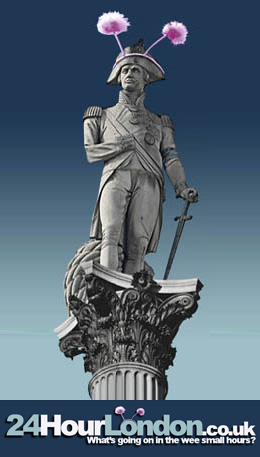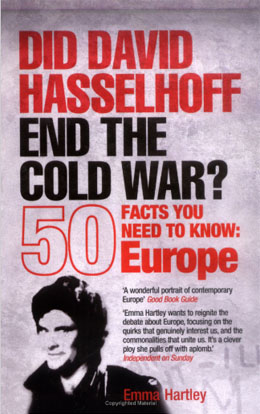Dear Mr Whittingdale,
Lovely to meet you last night: I'm so sorry I couldn't stay for dinner.
As I said, I'm a professional journalist - presently at the Guardian as a sub-editor, formerly at the Telegraph as an associate editor - who writes a music blog.
http://theglamourcave.blogspot.co.uk/
Two years ago I met someone who was a judge for the BBC folk awards and, thinking this might be interesting as there is usually a chorus of moaning about the nominees (the same names seem to come up every year, is the gist of it), did an off-the-record interview with them about it. The reason the interview was off the record was that the judge I met was under the impression that the names of the awards' judges were supposed to be a secret. There was some confusion around this. Mike Harding, who presented the BBC Radio 2 folk show at the time, said the names weren't a secret.
http://theglamourcave.blogspot.com/2011/11/bbc-folk-awards-raising-blood-pressure.html
But then John Leonard, who runs Smooth Operations, the production company that produces the folk show and the folk awards for the BBC, waded in and not only said that, yes, they were a secret, but also came up with an elaborate justification for this.
http://theglamourcave.blogspot.co.uk/2011/11/smooth-operations-and-bbc-compliance-on.html
It turned out that the BBC has guidelines for running awards that specify transparency as one of the criteria
http://www.bbc.co.uk/editorialguidelines/page/guidance-interactivity-awards
so I submitted a freedom of information request to the relevant department at the BBC
http://theglamourcave.blogspot.co.uk/2011/12/freedom-of-information-request-for.html
only to be told that the request for the names of the judges had been denied because the BBC folk awards are "journalism" and therefore excluded from submitting to FoI rules. Since I'm the journalist in this scenario, that was ridiculous. It made me wonder why go to all this trouble instead of simply supplying the names? By this stage there was so much interest that one would assume it would simply have been easier to supply the names.
Roy Greenslade at the Guardian had picked up the story
http://www.theguardian.com/media/greenslade/2011/dec/13/radio-2-awards-and-prizes
as did The Independent
http://www.independent.co.uk/arts-entertainment/tv/news/could-it-all-be-a-fiddle-folk-stars-tell-the-bbc-to-reveal-who-judges-awards-6358939.html
But nothing occurred until the next year, when a month or so before the nominations were announced I received a phone call from Fergus Dudley, head of compliance at Radio 2, saying that there were going to be some changes to the folk awards to make them more transparent
http://theglamourcave.blogspot.co.uk/2012/10/change-at-bbc-radio-two-folk-awards.html
I was invited by Fraser Nelson at the Spectator to write a piece at this stage about why it was important
http://blogs.spectator.co.uk/coffeehouse/2013/01/bbc-radio-2-folk-awards-bottom-of-the-class/
And that was basically where it lay until this year, when the awards nominations were announced in November and it became clear that Dudley's hints and suggestions about naming the judges this year were only that, and had apparently been designed to get me off his back. In response to my inquiries directly to Fergus Dudley and John Leonard I got an email from a junior press officer who was unaware of the history of the request.
This all sounds a bit specific and of interest only to folkies. But the BBC Radio 2 folk awards is the best marketing platform the UK acoustic and roots music industry has, although it does not appear to see itself in this way. There are, I understand, over 180 anonymous judges for these awards, all of whom by Smooth Operations' own admission, have a financial stake in the industry. This is the qualification for the job and many of them know each other. In fact they are laughingly referred to as the "folk mafia" (see my latest post, an interview with Maddy Prior of Steeleye Span, for an example of this). When I started writing about the awards the first thing John Leonard did was try to co-opt me by inviting me to become a judge.
Mumford & Sons are the biggest band in the world right now and to the rest of the world they are an English folk band. But no other English folk bands have benefited from this surge in international interest, despite there being a folk scene in the UK that is full to overflowing with young talent struggling to get by, because the industry's biggest marketing platform - the BBC Radio 2 folk awards - has never invited Mumford & Sons to take part, nor have they ever nominated them for an award for reasons explored in the Spectator piece. Instead, and despite a constant throughput of new young bands that need a boost in a difficult environment, the same bands run by the same handful of middle men and women get nominated every year, as if folk were a niche thing. Indeed, John Leonard argues that it is, which in his case is self-fulfilling. For instance, Laura Marling has had three unsuccessful Mercury nominations now, as if she were the only young British folk musician the industry-wide Mercury judges have heard of.
Here is a link to a recent More 4 documentary about the groundswell going on in the British folk industry saying many of the same things I'm saying here: I had nothing to do with its production. It is also worth noting that the documentary is one of the few pieces of TV folk output in this country that has had nothing to do with Smooth Operations, which also does much of the folk festival coverage for Sky.
This is a British industry crying out for the kind of help that the BBC is ideally suited to provide, indeed is supposed to be providing. But instead the BBC runs the awards as if they were a club for John Leonard's mates from the folk clubs of the 60s and 70s adding ever more "lifetime achievement awards" each year. These clubs are no longer relevant to a young generation of musicians financially crippled by college debt who can't afford to go touring up and down the country's folk clubs, which are - it often seems - entirely populated by people who are themselves in their 60s and 70s: this is not ageism, they are simply a very small section of the music-buying, gig-going public. John Leonard, it seems to me, is confused about folk clubs' relevance these days. Young musicians rely on the web for marketing when they are starting out, as every other industry does, but there's no indication from the awards nominations that the judges are even aware of the web, focusing on bands that have been around for four years or longer. There is a separate section for "young" musicians, which does little justice to the breadth and scope of what's out there.
Britain's creative industries are one of its great exports, I believe that the UK market is simply too small to support the amount of folk, roots and acoustic talent we have on these shores and that the BBC institutionally is not pulling its weight in this regard. I also think that if they named the judges of the folk awards, as Fergus Dudley (head of radio 2 compliance) suggested they would before doing a U-turn, we would see why the awards nominees are pulled from such a shallow pool of talent. (I have been told that there are judges on the list who haven't left their own homes for months, relying entirely on the Mark Radcliffe Radio 2 show for their information about what's new.) The fact that this has not been done, moreover, suggests that the BBC knows it has something to hide.
My campaigning on this issue has received an enormous amount of support from folk music fans and musicians, which is evident from the comments on the blogs, as well as emails and personal messages of support when I'm out and about. In particular Phil Widdows at Folk Cast has also campaigned on this.
I would be enormously grateful if you were able to pass this to the people at the committee who regularly deal with the BBC, to see if anything can be done: if any questions could be asked of Fergus Dudley about his intransigence on a matter that seems so cut and dried even by the standards of the BBC's own guidelines? I believe naming the folk awards judges would eventually have a knock-on effect for the music industry in this country that would be wildly disproportionate to the effort involved.
I also believe that the BBC's FoI office is "broken" and would be grateful if you could add my evidence to anything similar you have on the same subject.
All best wishes
Emma Hartley
All best wishes
Emma Hartley
* If anyone else would like to email John Whittingdale, to add support to my email, you can reach him at john.whittingdale.mp@parliament.uk This is a constituency office email address, but if you label the email "BBC folk awards, anonymous judging" it should reach the staff who deal with his duties as chairman of the culture, media and sport select committee.
* If you'd like to receive posts from this blog directly into your Facebook newsfeed, you could *like* its Facebook page and then use the drop-down menu to indicate that it's one of your "interests". This will enhance the possibility that you'll get them. You could also follow me on Twitter at @emma1hartley


















